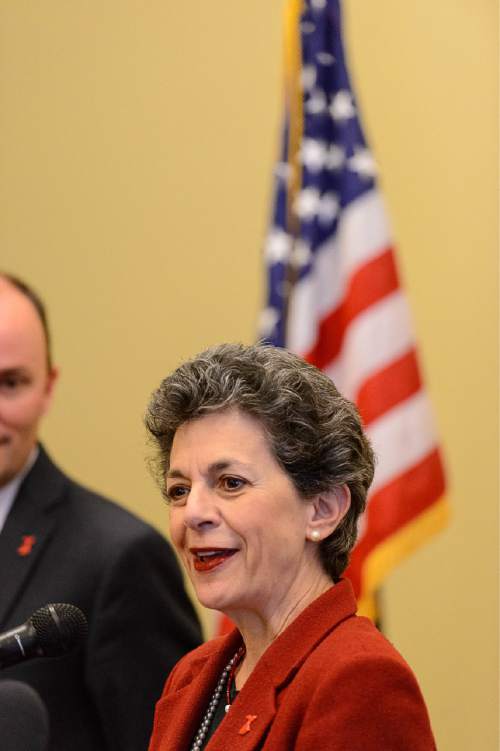This is an archived article that was published on sltrib.com in 2016, and information in the article may be outdated. It is provided only for personal research purposes and may not be reprinted.
Breanne Miller is a long-time Hillary Clinton supporter, championing her 2008 race and backing her now. She says Clinton is highly qualified — a former first lady, senator and secretary of state — and more likely to be effective in office than Vermont Sen. Bernie Sanders.
"Both candidates I think are supportive of women's issues and LGBT issues and things like that," she said. "But I think Hillary has a better record of getting things done in those areas."
Miller's opinion matters far more than most Utah Democrats. As the state party's vice chairwoman, Miller is one of just four superdelegates from the state, a special status that allows her to pick between the two candidates regardless of the results of Utah's presidential caucus on March 22, when the other 33 delegates will be awarded based on the vote.
Not shy about her support for Clinton, Miller has received a bunch of emails from Sanders supporters asking her to reconsider. While she's looking forward to the convention in Philadelphia in late July, she feels a little uncomfortable about the superdelegate process, where 712 party insiders nationwide can potentially make the difference between a candidate appearing on the general election ballot or going home.
"Overall it has been fine, I'm looking forward to casting my vote," she said. "But I don't think my vote should be worth more than those who attend the caucus."
That debate rages within the Democratic Party and even among the superdelegates themselves. Republicans don't give party insiders such special status.
Beyond Miller, Utah's superdelegates are national committeewoman Patrice Arent, a state lawmaker; committeeman Wayne Holland, a former state party chairman; and Peter Corroon, the current party chairman.
Arent, who is a member of Utah's House of Representatives, is also backing Clinton, but she declined to elaborate with the Legislature in session.
Corroon has decided that he'll back the candidate who wins the caucus vote.
"I'm not a real believer in a superdelegate, so as the chair of the party, I think it is my duty to vote as my Democrats want me to vote," he said.
The most recent poll in Utah, conducted by Dan Jones on behalf of Utah Policy, showed Clinton with a lead of 51 percent to 44 percent among the state's Democrats. A Tribune/Hinckley Institute poll from early January showed a somewhat slightly larger edge for Clinton, 50 percent to 40 percent.
Corroon would have preferred a primary election, but the state Legislature decided against paying for one, and the Democrats couldn't afford an online voting mechanism similar to what Republicans will try on March 22.
Instead, any registered voter can participate in neighborhood caucus meetings where they can cast their presidential ballot.
Corroon doesn't like the party's superdelegate system because he believes it "doesn't encourage more public participation" and can lead voters to think the election is controlled by insiders.
However, Holland defends the current process.
"These are people, who for the most part, deal with our party and its future and its success every single day," he said. "The criticism of them as people who have some hidden agenda, I think, is a little unfair."
Holland remains undecided among the candidates. He wants to see how Utah Democrats vote, but added "that doesn't necessarily mean if it is close that I will go that way."
He's trying to decide which candidate gives his party the best chance of retaining the White House.
"For a long time, I was not sure Bernie could pull that off, but he gains something every single day and it seems [Clinton] slips a little," he said. "By the time we get done with early March and Super Tuesday states, I think the picture will be clear."
He's referring to the 13 primary contests scheduled for Tuesday, a major milestone in the march toward the 2,382 delegates a candidate needs to claim the nomination.
After South Carolina, Clinton has a 544 to 85 advantage, built largely upon people like Miller and Arent. Of her pledged delegates, 449 are superdelegates, while Sanders, so far, has the support of only 19, according to an Associated Press survey.
The voters haven't decided, but it appears that the party insiders have made their choice.



